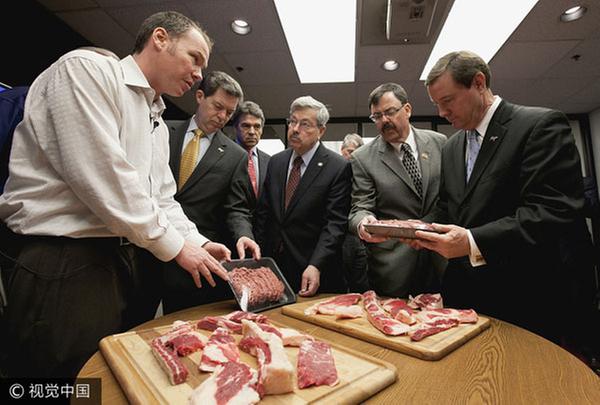Those worrying about US beef imports have big hats, no cattle
China Daily | Updated: 2017-08-03 07:50
 |
| Craig Letch (L), director of food quality and assurance for Beef Products Inc., interacts with governors from Kansas, Texas, Iowa, South Dakota, Nebraska during their visit to his beef plant in South Sioux City, Nebraska, March 29, 2012. [Photo/VCG] |
AS PART OF THE 100-DAY ACTION PLAN inked during President Xi Jinping and US President Donald Trump's meeting in Florida in April, China is once again allowing imports of US beef. Beijing News comments:
The US beef being sold in China on e-commerce sites and in supermarkets is priced around 100 yuan ($15) to 300 yuan per kilogram, which is twice the price of domestic beef.
But most of it has been fresh, rather than frozen, so it was transported to China by air, which pushed the price up.
Thus some beef producers in China worry that as more frozen US beef is shipped to China by sea, its price will decline to that of domestic beef, or even lower.
Such worries are surely unfounded, beef from Australia, Uruguay, New Zealand, Brazil and Argentina is already sold in China.
The restructuring of the cattle industry and related processing industries has been underway since then. Competition selects the superior and eliminates the inferior, thus the US beef imports will make the Chinese industry more efficient.
The backyard free-range cattle raisers have already largely disappeared given their low efficiency and lack of quality control procedures.
After China entered the World Trade Organization in 2001, a prevailing worry at home was China's textile and auto industries would collapse. Yet, after a painstaking industrial adjustment, the two industries have become more competitive than before. They not only survived, but are also competing in foreign markets.
It is the same now. The cattle farming and beef processing enterprises that survive the competition will do so based on their scale and the quality of their products.
























